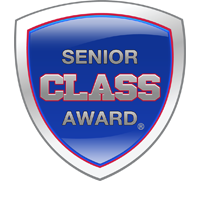
Four C’s or One?
The Lowe’s Senior CLASS Award is presented to a player who makes achievements in four C’s – classroom, character, community and competition – but in the end, it all comes down to just one.
Certainly, we want our student athletes to reach their potential in the classroom, excel in competition, and be active in the community. However, for the college athlete, it is strength of character that serves as a driving force behind the other three C’s.
It doesn’t always take strength of character to complete four years of college –newspapers and history books are littered with proof – but it takes strength of character to make and keep the commitments that come with being a student-athlete. If a student-athlete cuts class, cheats or plagiarizes, or simply fails to make grades, he’ll wind up benched, suspended, or worse, depriving his teammates of his talents.
Being a student-athlete means that the commitment to be a good teammate extends from practice and competition to the classroom and library, and that education isn’t just a way for a player to benefit himself, but a part of his commitment to his team. For the student-athlete, education isn’t just something you do for yourself, but something you do for others.
Being a positive influence in the community is often an expression of character, and the student-athlete has a unique opportunity to make an impact, whether his future lies in professional sports or as a private citizen.
Of course, most professional hockey teams in North America – if not all of them – have some form of community outreach program, and there are ample opportunities for private citizens to volunteer in their communities on a day-to-day basis. However, fame and/or fortune often separate professional athletes from the communities they represent on some level, particularly since most pros can leave at any moment via free agency or a trade. Meanwhile, ordinary citizens – valuable as their contributions are – lack the high profile and name recognition that can draw attention to a cause.
Here, the college athlete has the best of both worlds. As a college student, he truly lives in the community, developing a closer connection to the people he tries to help, and as a high-profile athlete, he commands a higher level of attention. Fans who follow their favorite college team online can see star players helping out at a soup kitchen, visiting sick children at the hospital, and reading to kids at elementary schools, right alongside the latest scores and highlights, setting an example fans can follow in their own lives. As a result, the community service a student-athlete does in college can be among the most meaningful and impactful volunteer work he’ll ever do.
The ties between competition and character are less apparent. In recent years, we’ve seen too many athletes show a disappointing lack of character, and character is hardly necessary to excel in competition. Besides, we already recognize great competitors, with awards like the Hobey Baker and honors like all-American and all-conference. Still, for an award that honors seniors, excellence in competition can be an indicator of strong character.
It’s a safe bet that most college hockey players who earn distinctions like all-conference and all-American can find someplace to play professionally. And yet, in recent years, players like Kevin Porter at Michigan, Brian Boyle at Boston College, Ryan Duncan and Joe Finley at North Dakota and Matt Gilroy at Boston University have put the pros on hold in order to get one more shot at a championship, delaying, and possibly risking, the futures that await them. A top student athlete’s decision to stay in school as is a commitment to something larger than himself, a big part of what character is all about.
You certainly don’t need superior athletic talent or a college education to have character – former President Harry Truman never went to college, and neither Mahatma Ghandi or Mother Teresa ever entered a decathlon – but with their four years of excellence in competition and the classroom, and their activity in the community, the nominees for this year’s Lowe’s Senior CLASS Award have demonstrated great strength of character.



